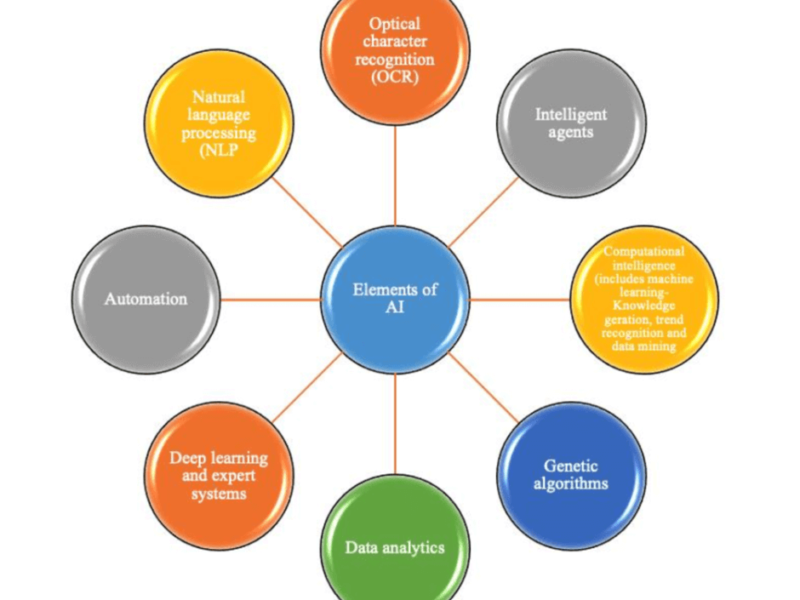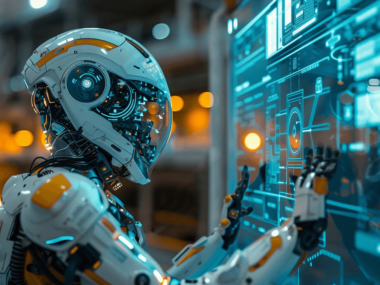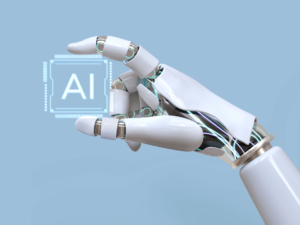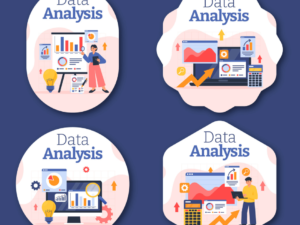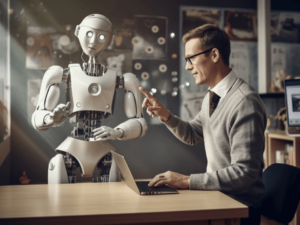AI tools and automation streamline complex processes. They boost efficiency in many industries. These technologies are reshaping how we work, live, and interact.
In business, AI and automation are game changers. They offer unmatched chances for innovation and productivity. With AI, we can automate tasks that need humans. This leads to faster decisions and lower costs.
Companies need to compete in a fast-changing digital world. Tools like chatbots for instant support can help. Algorithms that predict user behavior also help.
As they advance, using AI and automation in daily work is now a must for growth and survival. It’s not just a trend. This intro sets the stage for a deep dive into the impact of AI tools and automation on modern practices.
Table of Contents of Overview of AI Tools And Automation
The Rise of AI And Automation
The world of technology evolves daily. Artificial Intelligence (AI) and automation lead this change. They transform how we live and work. Let’s explore their journey and the current state.
Historical Milestones
AI and automation have a rich past. They trace back to ancient myths and automata. Their story unfolds over centuries.
- 1950s: AI research kicks off. Alan Turing asks, “Can machines think?”
- 1960s: First industrial robots work on assembly lines.
- 1990s: Internet boom. AI becomes a household term.
- 2000s: AI beats humans in chess. Automation enters homes.
- 2010s: Smart assistants emerge. Self-driving cars hit the roads.
Current Landscape
Today, AI and automation are everywhere. They aid in various tasks.
| Industry | AI and Automation Use |
|---|---|
| Healthcare | Robotic surgeries and virtual nursing assistants |
| Retail | Personalized shopping experiences |
| Finance | Algorithmic trading and fraud detection |
| Transportation | Autonomous vehicles and logistic optimization |
These tools also enhance creativity. They write music and create art. Their use will keep growing.
Key AI Technologies Powering Automation
The world of automation is evolving rapidly, thanks to advanced AI technologies. These technologies make machines smarter and more efficient. Let’s dive into the key AI technologies powering this change.
Machine Learning And Deep Learning
Machine Learning (ML) and Deep Learning are at the heart of AI automation. ML uses data to make predictions or decisions. Deep Learning, a subset of ML, handles more complex tasks. It mimics the human brain using layers of algorithms called neural networks. Key points include:
- ML adapts without being explicitly programmed.
- Deep Learning requires large data sets.
- These technologies improve over time with more data.
Natural Language Processing
Natural Language Processing (NLP) helps computers understand human language. It powers chatbots and virtual assistants. NLP breaks down language into shorter, elemental pieces. It tries to understand relationships between words. Main uses are:
- Translating languages.
- Sentiment analysis.
- Speech recognition.
Robotics And Cognitive Automation
Robotics and cognitive automation extend AI’s reach into the physical world. Robotics deals with the design, construction, and operation of robots. Cognitive automation combines ML and NLP to mimic human actions. Together, they:
| Feature | Description |
|---|---|
| Efficiency | Perform tasks faster and with fewer errors. |
| Adaptability | Learn and improve from past actions. |
Benefits of Integrating AI With Automation
The union of AI and automation unlocks new potentials. Businesses gain remarkable advantages by combining these powerful technologies. Here’s an insight into the key benefits:
Enhanced Efficiency And Productivity
AI-driven automation tools streamline complex tasks. This integration boosts workflow speed. It also frees employees from repetitive duties. As a result, teams focus on strategic work. This leads to higher overall productivity.
- Speedy task completion with minimal human intervention
- Redirection of human resources to critical thinking jobs
- Continuous operation 24/7 without fatigue
Improved Accuracy And Decision-making
AI enhances data analysis precision. It identifies patterns beyond human capability. Thus, it supports informed decision-making. This reduces errors and improves outcomes.
- Real-time data processing for instant insights
- Advanced analytics for precise forecasting
- Error reduction in repetitive tasks
Cost Savings And Scalability
Automation with AI cuts operational costs. It does this by optimizing resource use. It also adapts to workload changes without extra expenses. This allows businesses to scale easily.
| Cost Factor | Impact of AI & Automation |
|---|---|
| Labor | Reduction in manual task force |
| Efficiency | Less waste, higher throughput |
| Scalability | Easy adjustment to business growth |

Credit: www.youtube.com
Sectors Transformed By AI Tools
Artificial Intelligence (AI) is changing the game across various sectors. Companies use AI to boost efficiency, reduce costs, and enhance customer experiences. This technology leads to significant transformations in several industries.
Manufacturing And Supply Chain
AI tools revolutionize how factories operate. They enable machines to work smarter and safer. These tools help in predicting maintenance needs. This ensures that machines work without unexpected breaks. AI also helps in managing supply chains. It makes tracking and delivering goods faster and more reliable.
- Smart Automation: Robots and AI systems work together. They make production lines quicker and less prone to error.
- Quality Control: AI-powered cameras detect defects in products. They ensure only the best items reach consumers.
- Inventory Management: AI predicts when stocks will run low. It helps to reorder supplies at the right time.
Healthcare And Life Sciences
AI is a game-changer in healthcare. It helps doctors diagnose diseases earlier. AI tools analyze medical data faster than humans can. This leads to better treatment plans.
| AI Application | Impact |
|---|---|
| Drug Discovery | AI speeds up the creation of new medicines. |
| Personalized Medicine | Treatments match each patient’s unique needs. |
| Robot-Assisted Surgery | Surgeries become more precise, reducing recovery times. |
Finance And Customer Service
In finance, AI tools help in spotting fraudulent activities. They keep customers’ money safe. AI chatbots handle customer questions quickly. This keeps customers happy.
- Algorithmic Trading: AI analyzes market data to make smart trades fast.
- Risk Management: AI assesses risks in lending, insuring, and investing.
- Customer Support: AI chatbots provide instant answers 24/7.
Challenges In AI Adoption
Adopting AI tools and automation brings many benefits. Yet, it also presents several challenges. Understanding these challenges helps businesses prepare better. Let’s explore these key obstacles.
Data Privacy And Security Concerns
Data privacy and security are big worries for companies using AI. AI systems often need access to vast amounts of data. This data can include personal details about people. Keeping this data safe is a top priority. Breaches can lead to trust issues and legal problems.
- Data breaches can expose sensitive information.
- Protecting data requires strong security measures.
- Laws like GDPR set strict rules for handling data.
Skill Gaps And Workforce Displacement
AI changes the way we work. Some jobs might change a lot, or even disappear. This can scare people. At the same time, new jobs will appear. But, workers need the right skills for these new jobs. Right now, not everyone has these skills. This is known as a skill gap. Training and education are key to solving this problem.
- Identify skills needed for future jobs.
- Invest in training for current employees.
- Support schools in teaching these new skills.
Regulatory And Ethical Considerations
AI must be used in a fair and ethical way. This means making sure AI does not harm people or society. Governments are creating rules to ensure this. Yet, these rules can be complex and different around the world. Businesses must stay informed and follow these rules closely.
| Concern | Example |
|---|---|
| Privacy | Following laws like GDPR. |
| Transparency | Explaining how AI makes decisions. |
| Accountability | Being responsible for AI actions. |

Credit: www.functionize.com
Best Practices For Implementing Ai Automation
Implementing AI automation transforms businesses. It streamlines operations, boosts efficiency, and propels growth. To succeed, follow best practices.
Strategic Planning And Goal Setting
Begin with clear objectives. Define what AI should achieve. Align AI goals with business strategy. This ensures focus and direction.
- Identify key performance indicators (KPIs). These measure AI’s impact.
- Set realistic timelines. AI integration takes time.
- Plan for scale. Start small, then expand AI applications.
Building A Skilled Team
A capable team is crucial for AI success. Hire diverse talents. Blend AI expertise with industry knowledge. Offer continuous learning opportunities.
| Team Role | Responsibilities |
|---|---|
| Data Scientists | Analyze data, build AI models. |
| AI Engineers | Develop and deploy AI solutions. |
| Project Managers | Ensure AI projects meet goals. |
Continuous Monitoring And Optimization
AI systems need constant evaluation. Monitor performance regularly. Adjust as needed to improve outcomes. Encourage feedback from users.
- Review AI performance against set KPIs.
- Optimize algorithms for better accuracy.
- Gather user insights to refine AI tools.
Future Trends In AI And Automation
The world of AI and automation is fast-evolving. Exciting trends are shaping the future. Let’s explore what’s ahead.
Autonomous Systems And Vehicles
Self-driving cars and drones are just the start. They navigate roads and skies with ease. Each year, they get smarter.
- Self-repairing abilities are on the rise.
- They learn from each trip they take.
- Safety is improving, reducing accidents.
Ai In Internet of Things (IoT)
Devices at home and work are getting smarter. They talk to each other. They make life easier.
- Smart homes adjust to your needs.
- Wearables track health in real time.
- Energy savings are huge with smart tech.
Advancements In AI Algorithms
AI brains are learning faster than ever. They solve problems. They understand us better.
- Language understanding is more natural.
- They predict needs with high accuracy.
- Machine learning is more efficient.

Credit: www.researchgate.net
Preparing For An AI-driven World
Preparing for an AI-Driven World is vital for our future. Artificial Intelligence (AI) shapes how we work, learn, and live. To thrive, we must adapt to AI’s rapid growth. This means updating our skills and understanding AI’s impact on society.
Educational Initiatives And Lifelong Learning
Education must evolve with AI advancements. Schools are introducing AI topics early on. This prepares students for tomorrow’s job market. Adults are also learning through online courses and workshops. It’s a way to keep up with new technology trends.
- Curriculum updates: Schools add AI to subjects.
- Online platforms: They offer courses for all ages.
- Workshops: These provide hands-on AI experience.
Policy Frameworks And Societal Impact
Governments are creating policies for AI’s safe use. These policies protect citizens and promote fair AI practices. They also help businesses to innovate responsibly. Society must understand AI’s benefits and risks.
- AI ethics guidelines protect user rights.
- Regulations ensure AI fairness and transparency.
- Public awareness campaigns inform about AI.
Embracing Change And Innovation
Change is constant with AI. Businesses must embrace innovation to succeed. They do this by adopting new technologies. Employees learn to work with AI tools. Everyone benefits from improved services and products.
| Area | Change |
|---|---|
| Businesses | Adopt AI technologies |
| Employees | Learn AI skills |
| Consumers | Get better products |
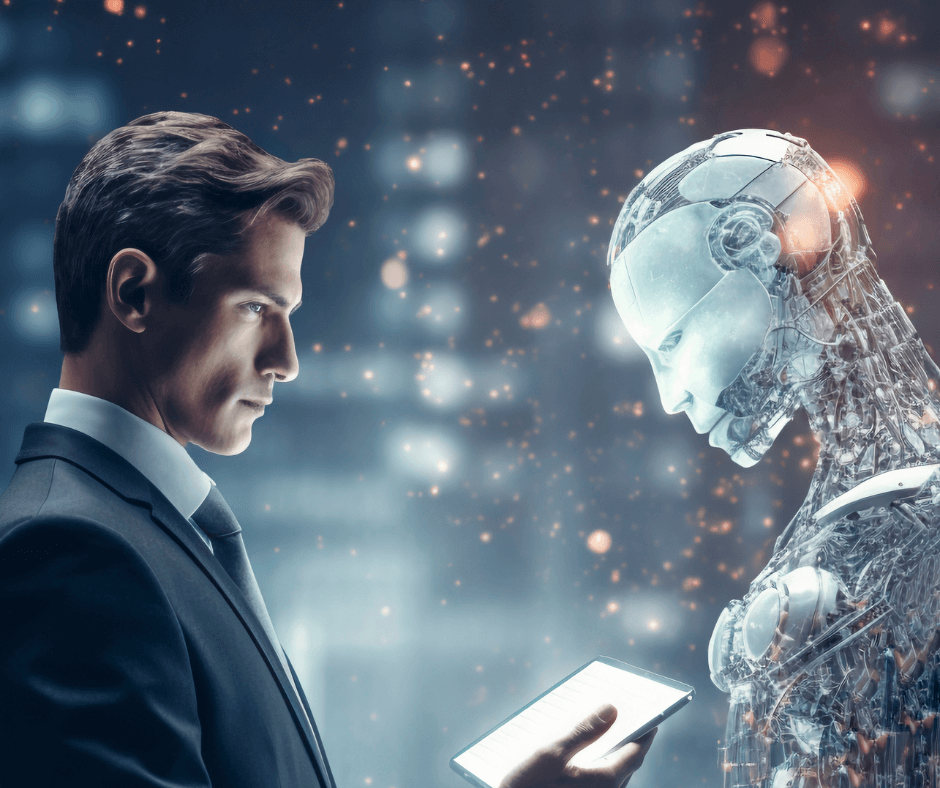
Frequently Asked Questions
What Are AI Tools In Technology?
AI tools in technology refer to software and platforms that use artificial intelligence to automate tasks, analyze data, and enhance decision-making. They can streamline workflows, predict trends, and personalize user experiences.
How Does Ai Automation Impact Businesses?
AI automation can significantly boost efficiency, reduce costs, and enhance accuracy in business operations. It helps companies to process large volumes of data quickly and make informed decisions based on insights.
Can AI Tools Improve Productivity?
Yes, AI tools can improve productivity by automating routine tasks, minimizing errors, and allowing employees to focus on more strategic work. This leads to better use of time and resources.
What Industries Benefit From AI Automation?
AI automation benefits various industries including healthcare, finance, manufacturing, and retail. It streamlines processes, improves customer service, and increases operational efficiency across sectors.
Conclusion on Overview of AI Tools And Automation
The Overview of AI Tools and Automation shows that AI is changing things, not just enabling them. They are reshaping operations in various industries. AI tools and automation are boosting efficiency across many sectors.
They are in manufacturing, healthcare, finance, and customer service. These tools cut costs and improve results by enabling better decisions.
Integrating AI tools and automation into business is an ongoing journey. It involves constant improvement and adapting to new challenges and opportunities. In the future, AI will drive more innovation and productivity. It will provide advanced solutions to complex problems.
Businesses that embrace these technologies now will gain a competitive edge. They will set the stage for lasting success. AI and automation are now a must for success in a digital world. AI can help organizations unlock new potentials, innovate, and adapt to modern markets.
In conclusion, the “Overview of AI Tools and Automation” shows their power to transform. The future of business and technology is tied to AI and automation. Their impact is clear as we see it grow. To lead its field and drive digital change, an organization must accept this reality.
